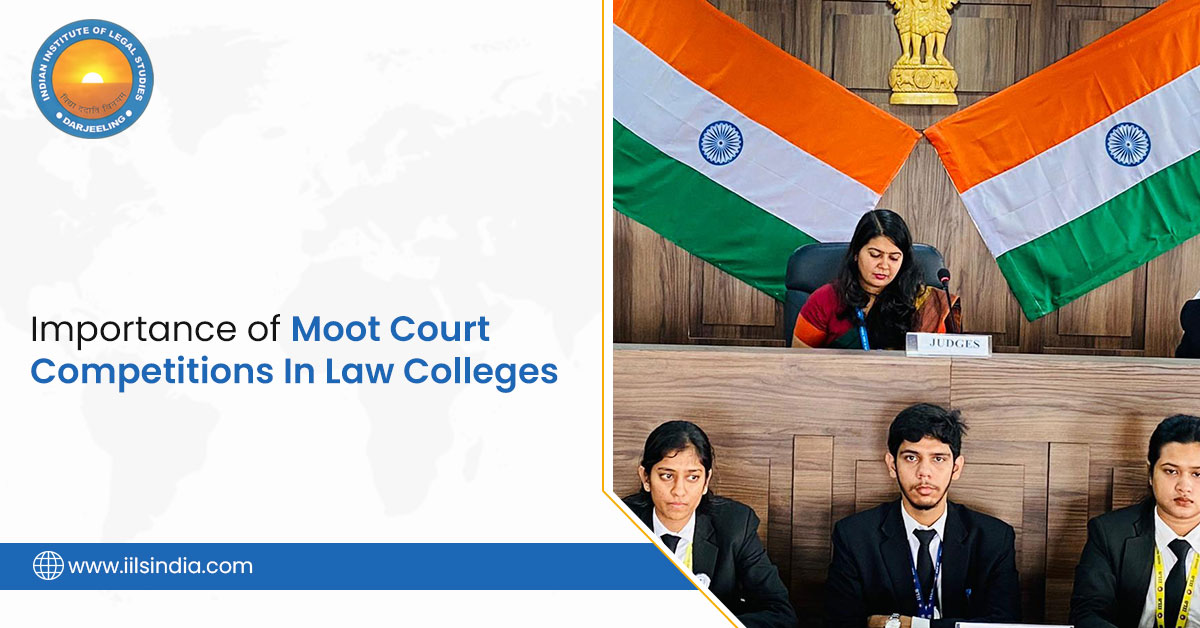One of the most interesting activities for law school students is the moot court. The purpose of this activity is to raise law students’ greater awareness of how the courts work in practice, The importance of proper etiquette, proper dress, and the use of formal language. The legal study in West Bengal teaches that mooting is a great opportunity to improve confidence, presentation, writing, and research skills. Attending and taking part in moot courts is very crucial for aspiring attorneys, aspiring judges, and arbitrators. In the law colleges of West Bengal, Quarterly Moot court competitions are held, and the Students are given a chance to interact and cooperate with their hypothetical competitors during intercollegiate or intercollegiate mooting sessions.
In a moot court, which is a modelled replica of an actual courtroom, judicial proceedings and trials are performed, where law students take on the roles of practitioners and undertake all the duties and obligations assigned to them so that they can show their professional behaviour, potential for independent ideas, and ability to answer questions convincingly through persuasive speaking, writing, and persuasive competencies.
As taught in law colleges in West Bengal moot court competitions are held all across the country so that students from various law schools in India can interact with one another to better comprehend all the aspects of the mooting approach. The primary objectives of mooting are to provide law learners with an adequate framework in the field and to expand their knowledge of the law. A mooting proposition, which may involve any law-related topic, is given to each team in advance so that they can prepare a memorial that will test their skills in conducting research and abiding by deadlines. The legal study in West Bengal teaches the participants how to overcome challenges under time limitations in order to deliver beneficial results. Mooting aids in creating and developing the capacity for debating passively in front of a judge. Defendants and Respondents are the two teams that make up a moot court. Both teams must conduct research on and submit their arguments for a hypothetical case that is presented at the mooting.
As taught in law colleges in West Bengal, the two main terms that are very crucial for moot courts are:
- Written memorials
- Oral proceedings
1. Written memorials are printed writings that consist of the facts, issues, and arguments of hypothetical cases. For either side of the argument, the teams must create memorials. To help students develop their thought processes, this is done. The teams hold sessions for in-depth conversations and undertake research in order to design a memorial of fine standards.
2. Oral proceedings are the body languages, gestures, and communication skills that the teams must do in front of the judges. After the submission of the written memorials, the oral pleadings preparation process starts.
“Youth is not an achievement; it is an opportunity, “says Mr. Justice R Kishore Prasad. Don’t let it pass by “just like “. Admission into a professional course is not a badge of achievement, but an opportunity to continually improve one’s professional skill, and one must not let it pass.”
Thus, It not only helps academically but also for the growth of career building. As mooting is, One of the most vital processes for career and future development. When a legal student goes to an interview session, possessing expertise in multiple types of moots on his\her curriculum vitae will be very beneficial because the recruiter will see that the individual has a lot of expertise in this field and knowledge, which will significantly raise the probability of being selected. Mooting is one activity that inspires many attitudes and diligence that are prerequisites by many legal firms’ recruitment agencies.
The legal study requires a lot more than theoretical information; it also involves a practical understanding of how to implement the rules and regulations in the most effective manner.
So, Mooting has become a crucial component of legal institutions, and presently every law student needs it desperately whether a student of 5 years or 3 years LLB course.

